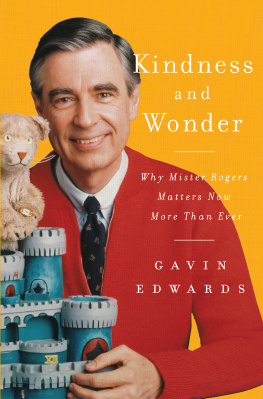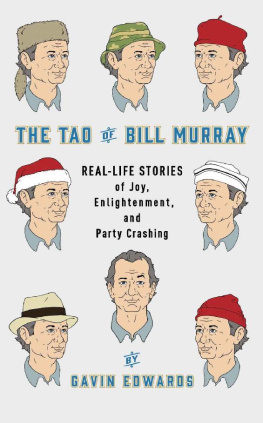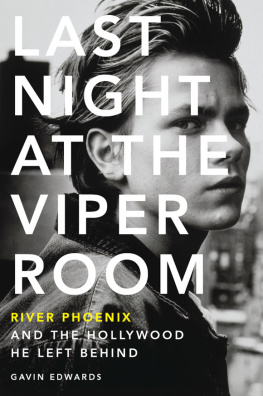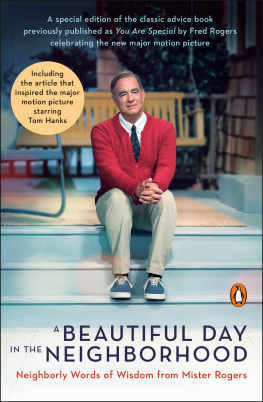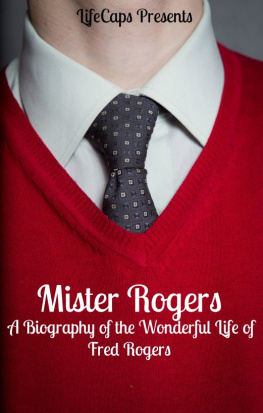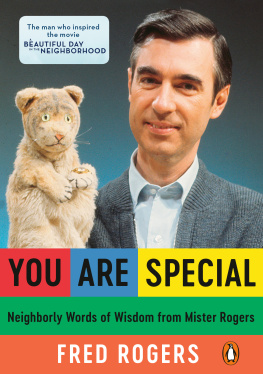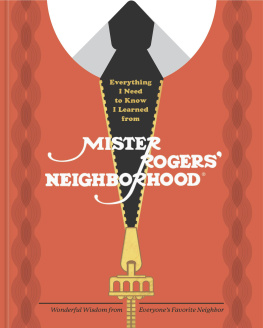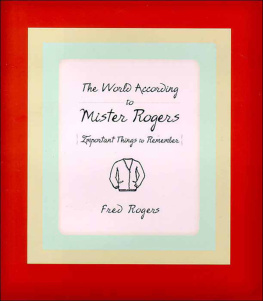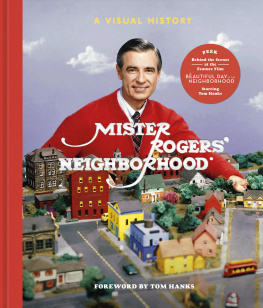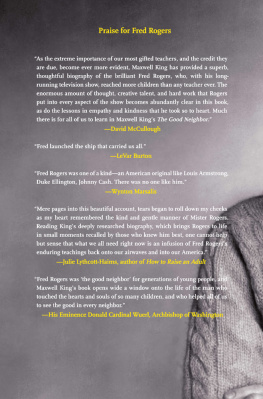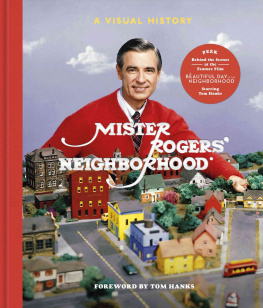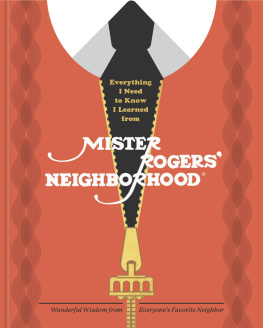Table of Contents
Landmarks
Thank you, Fred McFeely Rogers, for helping me grow up with such gentle care, the way you helped so many people. And thank you for the way you lived your life, which has given me inspiration again now that Im an adult.
Thank you to Carrie Thornton, who edited this book with her usual panache. Thank you to all her kick-ass colleagues at Dey Street Books, including Tatiana Dubin, Paula Szafranski, Greg Villepique, Andrea Molitor, Stephanie Vallejo, Danielle Bartlett, Kell Wilson, and Andrea Peabbles.
Many thanks to my agent Daniel Greenberg and all his comrades at the Levine-Greenberg-Rostan agency who staunchly look after my interests, especially Tim Wojcik and Miek Coccia.
Thank you to the brilliant illustrator R. Sikoryak; this is our third collaboration (the other two being The Tao of Bill Murray and The World According to Tom Hanks ) and he constantly astonishes me with his artistic gifts and his easygoing genius. Go check out all his other books and comics. (And he would like to thank his wife, Kriota Willberg.)
Thanks to Emily Uhrin at the Fred Rogers Center in Latrobe, Pennsylvania, for her assistance with their archives. For advice and aid, many thanks to Temilade Adejumo, Alan Bunce, Stephanie Cozart Burton, Liz Carlson, Carole DAgostino, Stephanie Dempsey, Tim Ferrin, Danielle Fuerth, Paul Goldberg, LJ Gysel, Thane Gysel, Dean Jordan, Judy Katz, Nina Kiersted, Kevin Leonard, Jeff Malmberg, Jen McGivney, Monica Morita, Bernadelle Richter, and Basil Twist.
Thanks to all my neighbors in all my neighborhoods, especially the awe-inspiring Rob Sheffield for his essential feedback on an early version of this manuscript, which made the book better in a thousand ways. Thanks to my dear friend Jeff Jackson, whose deep knowledge of both Andy Warhol and George Romero was incredibly helpful. Thanks to Bill Tipper and Steve Crystal for long-distance advice and encouragement, and to James Hannaham (my one-time Fred Rogers memorial-service coconspirator) for being his excellent self. And this book wouldnt exist without the well-timed hospitality and generosity of Chuck Bargermy profound thanks to him.
Jen Sudul Edwards, the woman I love, is a brilliant, generous dynamo of a human being whos an inspiration to just about everybody she crosses paths withand thats a lot of peoplebut Im the one whos lucky enough to be married to her.
This book is dedicated to my two wonderful sons, Dashiell and Strummer, who fill my life with adventure and dancing and birds. Dashiell asked for me to dedicate a book to him, which I was extremely happy to doalthough I know he would really have preferred that it was about Samuel L. Jackson.
And my thanks to you, for reading this book. Like Mister Rogers, I like you just the way you are.
The World According to Tom Hanks: The Life, the Obsessions, the Good Deeds of Americas Most Decent Guy
The Beautiful Book of Exquisite Corpses: A Creative Game of Limitless Possibilities (editor)
The Tao of Bill Murray: Real-Life Stories of Joy, Enlightenment, and Party Crashing
Can I Say: Living Large, Cheating Death, and Drums, Drums, Drums (with Travis Barker)
Last Night at the Viper Room: River Phoenix and the Hollywood He Left Behind
VJ: The Unplugged Adventures of MTVs First Wave (with Nina Blackwood, Mark Goodman, Alan Hunter, and Martha Quinn)
Is Tiny Dancer Really Eltons Little John?: Musics Most Enduring Mysteries, Myths, and Rumors Revealed
Scuse Me While I Kiss This Guy: And Other Misheard Lyrics
GAVIN EDWARDS is the New York Times bestselling author of eleven books, including The Tao of Bill Murray, Last Night at the Viper Room, The World According to Tom Hanks, and the Scuse Me While I Kiss This Guy series of misheard lyrics collections. A longtime contributor to Rolling Stone , he has written for the New York Times, Wired, Billboard, Details, and GQ. Gavin lives in Charlotte, North Carolina, with his wife, museum curator Jen Sudul Edwards, and their two sons.
Discover great authors, exclusive offers, and more at hc.com .
Australia
HarperCollins Publishers Australia Pty. Ltd.
Level 13, 201 Elizabeth Street
Sydney, NSW 2000, Australia
www.harpercollins.com.au
Canada
HarperCollins Publishers Ltd
Bay Adelaide Centre, East Tower
22 Adelaide Street West, 41st Floor
Toronto, Ontario, M5H 4E3
www.harpercollins.ca
India
HarperCollins India
A 75, Sector 57
Noida
Uttar Pradesh 201 301
www.harpercollins.co.in
New Zealand
HarperCollins Publishers New Zealand
Unit D1, 63 Apollo Drive
Rosedale 0632
Auckland, New Zealand
www.harpercollins.co.nz
United Kingdom
HarperCollins Publishers Ltd.
1 London Bridge Street
London SE1 9GF, UK
www.harpercollins.co.uk
United States
HarperCollins Publishers Inc.
195 Broadway
New York, NY 10007
www.harpercollins.com
W hen Fred Rogers was in the seminary, preparing for life as a Presbyterian minister, he would attend the sermons of as many different preachers as he could, learning the various ways that a homily could move the soul. Circa 1958, on a weekend vacation in a small New England town, Fred and some friends decided to visit the hamlets chapel, having heard that the local preacher was impressive.
Unfortunately, in the pulpit that Sunday was an aged substitute, filling in for the absent minister. I heard the worst sermon I could ever have imagined, Fred remembered. He sat in the pew, quietly wincing, itemizing all the ways the substitute was violating the homiletic rules that the seminary had been teaching him.
The pinch-hitting preacher finallyMercifully, Fred saidended and Fred turned to the woman sitting next to him. To his surprise, his friend had not been enduring the sermon while grinding her teeth: she had tears running down her cheeks.
He said exactly what I needed to hear, she whispered.
Fred was stunned for a moment, but then had an epiphany. The woman beside me had come in need, he said. Somehow the words of that poorly crafted sermon had been translated into a message that spoke to her heart. On the other hand, I had come in judgment, and I heard nothing but the faults.
Thunderstruck, Fred resolved to learn from the experience: That sermons effect on the person beside me, he said, turned out to be one of the great lessons of my life. If somebody didnt hear what Fred was saying, then it didnt matter whether it was because it was poorly expressed or rejected out of hand; Fred would need to find another way to say it, and then another, and hope that eventually his message got through. Conversely, if somebody wanted to hear what he was telling them, he needed to make the most of that opportunity. Fred said, I now know the space between a person doing his or her best to deliver a message of good news and the needy listener is holy ground.
Working to consecrate the speaker-listener union, Fred Rogers constantly searched for new ways to express his beliefs stripped of any rhetorical flourishes. He rarely quoted from scripture, but Biblical passages could inspire him to write a song or a sentence. He was a master at boiling down both theology and the wisdom of child development into concise messages that could touch peoples lives.
Consider this passage by Fred Rogers: How our words are understood doesnt depend just on how we express our ideas. It also depends on how someone receives what were saying. I think the most important part about communicating is the listening we do beforehand. When we can truly respect what someone brings to what were offering, it makes the communication all the more meaningful.

